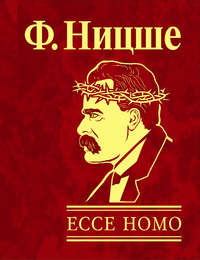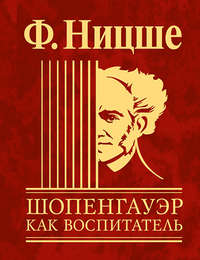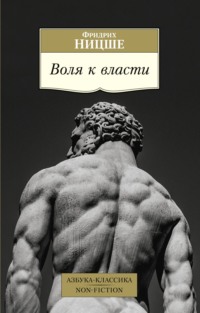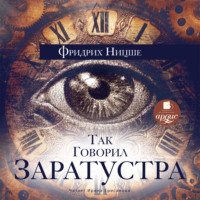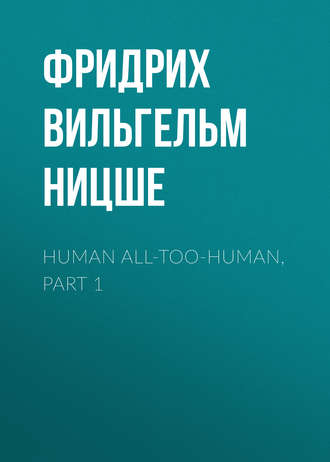 полная версия
полная версияHuman All-Too-Human, Part 1
Fidelity As a Proof of Validity. – It is a perfect sign of a sound theory if during forty years its originator does not mistrust it; but I maintain that there has never yet been a philosopher who has not eventually deprecated the philosophy of his youth. Perhaps, however, he has not spoken publicly of this change of opinion, for reasons of ambition, or, what is more probable in noble natures, out of delicate consideration for his adherents.
254The Increase of What Is Interesting. – In the course of higher education everything becomes interesting to man, he knows how to find the instructive side of a thing quickly and to put his finger on the place where it can fill up a gap in his ideas, or where it may verify a thought. Through this boredom disappears more and more, and so does excessive excitability of temperament. Finally he moves among men like a botanist among plants, and looks upon himself as a phenomenon, which only greatly excites his discerning instinct.
255The Superstition of the Simultaneous. – Simultaneous things hold together, it is said. A relative dies far away, and at the same time we dream about him, – Consequently! But countless relatives die and we do not dream about them. It is like shipwrecked people who make vows; afterwards, in the temples, we do not see the votive tablets of those who perished. A man dies, an owl hoots, a clock stops, all at one hour of the night, – must there not be some connection? Such an intimacy with nature as this supposition implies is flattering to mankind. This species of superstition is found again in a refined form in historians and delineators of culture, who usually have a kind of hydrophobic horror of all that senseless mixture, in which individual and national life is so rich.
256Action and Not Knowledge Exercised by Science. – The value of strictly pursuing science for a time does not lie precisely in its results, for these, in proportion to the ocean of what is worth knowing, are but an infinitesimally small drop. But it gives an additional energy, decisiveness, and toughness of endurance; it teaches how to attain an aim suitably. In so far it is very valuable, with a view to all that is done later on, to have once been a scientific man.
257The Youthful Charm of Science. – The search for truth still retains the charm of being in strong contrast to gray and now tiresome error; but this charm is gradually disappearing. It is true we still live in the youthful age of science and are accustomed to follow truth as a lovely girl; but how will it be when one day she becomes an elderly, ill-tempered looking woman? In almost all sciences the fundamental knowledge is either found in earliest times or is still being sought; what a different attraction this exerts compared to that time when everything essential has been found and there only remains for the seeker a scanty gleaning (which sensation may be learnt in several historical disciplines).
258The Statue of Humanity. – The genius of culture fares as did Cellini when his statue of Perseus was being cast; the molten mass threatened to run short, but it had to suffice, so he flung in his plates and dishes, and whatever else his hands fell upon. In the same way genius flings in errors, vices, hopes, ravings, and other things of baser as well as of nobler metal, for the statue of humanity must emerge and be finished; what does it matter if commoner material is used here and there?
259A Male Culture. – The Greek culture of the classic age is a male culture. As far as women are concerned, Pericles expresses everything in the funeral speech: "They are best when they are as little spoken of as possible amongst men." The erotic relation of men to youths was the necessary and sole preparation, to a degree unattainable to our comprehension, of all manly education (pretty much as for a long time all higher education of women was only attainable through love and marriage). All idealism of the strength of the Greek nature threw itself into that relation, and it is probable that never since have young men been treated so attentively, so lovingly, so entirely with a view to their welfare (virtus) as in the fifth and sixth centuries B.C. – according to the beautiful saying of Hölderlin: "denn liebend giebt der Sterbliche vom Besten."14 The higher the light in which this relation was regarded, the lower sank intercourse with woman; nothing else was taken into consideration than the production of children and lust; there was no intellectual intercourse, not even real love-making. If it be further remembered that women were even excluded from contests and spectacles of every description, there only remain the religious cults as their sole higher occupation. For although in the tragedies Electra and Antigone were represented, this was only tolerated in art, but not liked in real life, – just as now we cannot endure anything pathetic in life but like it in art. The women had no other mission than to produce beautiful, strong bodies, in which the father's character lived on as unbrokenly as possible, and therewith to counteract the increasing nerve-tension of such a highly developed culture. This kept the Greek culture young for a relatively long time; for in the Greek mothers the Greek genius always returned to nature.
260The Prejudice in Favour of Greatness. – It is clear that men overvalue everything great and prominent. This arises from the conscious or unconscious idea that they deem it very useful when one person throws all his strength into one thing and makes himself into a monstrous organ. Assuredly, an equal development of all his powers is more useful and happier for man; for every talent is a vampire which sucks blood and strength from other powers, and an exaggerated production can drive the most gifted almost to madness. Within the circle of the arts, too, extreme natures excite far too much attention; but a much lower culture is necessary to be captivated by them. Men submit from habit to everything that seeks power.
261The Tyrants of the Mind. – It is only where the ray of myth falls that the life of the Greeks shines; otherwise it is gloomy. The Greek philosophers are now robbing themselves of this myth; is it not as if they wished to quit the sunshine for shadow and gloom? Yet no plant avoids the light; and, as a matter of fact, those philosophers were only seeking a brighter sun; the myth – was not pure enough, not shining enough for them. They found this light in their knowledge, in that which each of them called his "truth." But in those times knowledge shone with a greater glory; it was still young and knew but little of all the difficulties and dangers of its path; it could still hope to reach in one single bound the central point of all being, and from thence to solve the riddle of the world. These philosophers had a firm belief in themselves and their "truth," and with it they overthrew all their neighbours and predecessors; each one was a warlike, violent tyrant. The happiness in believing themselves the possessors of truth was perhaps never greater in the world, but neither were the hardness, the arrogance, and the tyranny and evil of such a belief. They were tyrants, they were that, therefore, which every Greek wanted to be, and which every one was if he was able. Perhaps Solon alone is an exception; he tells in his poems how he disdained personal tyranny. But he did it for love of his works, of his law-giving; and to be a law-giver is a sublimated form of tyranny. Parmenides also made laws. Pythagoras and Empedocles probably did the same; Anaximander founded a city. Plato was the incarnate wish to become the greatest philosophic law-giver and founder of States; he appears to have suffered terribly over the non-fulfilment of his nature, and towards his end his soul was filled with the bitterest gall. The more the Greek philosophers lost in power the more they suffered inwardly from this bitterness and malice; when the various sects fought for their truths in the street, then first were the souls of these wooers of truth completely clogged through envy and spleen; the tyrannical element then raged like poison within their bodies. These many petty tyrants would have liked to devour each other; there survived not a single spark of love and very little joy in their own knowledge. The saying that tyrants are generally murdered and that their descendants are short-lived, is true also of the tyrants of the mind. Their history is short and violent, and their after-effects break off suddenly. It may be said of almost all great Hellenes that they appear to have come too late: it was thus with Æschylus, with Pindar, with Demosthenes, with Thucydides: one generation – and then it is passed for ever. That is the stormy and dismal element in Greek history. We now, it is true, admire the gospel of the tortoises. To think historically is almost the same thing now as if in all ages history had been made according to the theory "The smallest possible amount in the longest possible time!" Oh! how quickly Greek history runs on! Since then life has never been so extravagant – so unbounded. I cannot persuade myself that the history of the Greeks followed that natural course for which it is so celebrated. They were much too variously gifted to be gradual the orderly manner of the tortoise when running a race with Achilles, and that is called natural development. The Geeks went rapidly forward, but equally rapidly downwards; the movement of the whole machine is so intensified that a single stone thrown amid its wheels was sufficient to break it. Such a stone, for instance, was Socrates; the hitherto so wonderfully regular, although certainly too rapid, development of the philosophical science was destroyed in one night. It is no idle question whether Plato, had he remained free from the Socratic charm, would not have discovered a still higher type of the philosophic man, which type is for ever lost to us. We look into the ages before him as into a sculptor's workshop of such types. The fifth and sixth centuries B.C. seemed to promise something more and higher even than they produced; they stopped short at promising and announcing. And yet there is hardly a greater loss than the loss of a type, of a new, hitherto undiscovered highest possibility of the philosophic life:– Even of the older type the greater number are badly transmitted; it seems to me that all philosophers, from Thales to Democritus, are remarkably difficult to recognise, but whoever succeeds in imitating these figures walks amongst specimens of the mightiest and purest type. This ability is certainly rare, it was even absent in those later Greeks, who occupied themselves with the knowledge of the older philosophy; Aristotle, especially, hardly seems to have had eyes in his head when he stands before these great ones. And thus it appears as if these splendid philosophers had lived in vain, or as if they had only been intended to prepare the quarrelsome and talkative followers of the Socratic schools. As I have said, here is a gap, a break in development; some great misfortune must have happened, and the only statue which might have revealed the meaning and purpose of that great artistic training was either broken or unsuccessful; what actually happened has remained for ever a secret of the workshop.
That which happened amongst the Greeks – namely, that every great thinker who believed himself to be in possession of the absolute truth became a tyrant, so that even the mental history of the Greeks acquired that violent, hasty and dangerous character shown by their political history, – this type of event was not therewith exhausted, much that is similar has happened even in more modern times, although gradually becoming rarer and now but seldom showing the pure, naïve conscience of the Greek philosophers. For on the whole, opposition doctrines and scepticism now speak too powerfully, too loudly. The period of mental tyranny is past. It is true that in the spheres of higher culture there must always be a supremacy, but henceforth this supremacy lies in the hands of the oligarchs of the mind. In spite of local and political separation they form a cohesive society, whose members recognise and acknowledge each other, whatever public opinion and the verdicts of review and newspaper writers who influence the masses may circulate in favour of or against them. Mental superiority, which formerly divided and embittered, nowadays generally unites; how could the separate individuals assert themselves and swim through life on their own course, against all currents, if they did not see others like them living here and there under similar conditions, and grasped their hands in the struggle as much against the ochlocratic character of the half mind and half culture as against the occasional attempts to establish a tyranny with the help of the masses? Oligarchs are necessary to each other, they are each other's best joy, they understand their signs, but each is nevertheless free, he fights and conquers in his >place and perishes rather than submit.
262Homer. – The greatest fact in Greek culture remains this, that Homer became so early Pan-Hellenic. All mental and human freedom to which the Greeks attained is traceable to this fact. At the same time it has actually been fatal to Greek culture, for Homer levelled, inasmuch as he centralised, and dissolved the more serious instincts of independence. From time to time there arose from the depths of Hellenism an opposition to Homer: but he always remained victorious. All great mental powers have an oppressing effect as well as a liberating one; but it certainly makes a difference whether it is Homer or the Bible or Science that tyrannises over mankind.
263Talents. – In such a highly developed humanity as the present, each individual naturally has access to many talents. Each has an inborn talent, but only in a few is that degree of toughness, endurance, and energy born and trained that he really becomes a talent, becomes what he is, that is, that he discharges it in works and actions.
264The Witty Person Either Overvalued Or Undervalued. – Unscientific but talented people value every mark of intelligence, whether it be on a true or a false track; above all, they want the person with whom they have intercourse to entertain them with his wit, to spur them on, to inflame them, to carry them away in seriousness and play, and in any case to be a powerful amulet to protect them against boredom. Scientific natures, on the other hand, know that the gift of possessing all manner of notions should be strictly controlled by the scientific spirit: it is not that which shines, deludes and excites, but the often insignificant truth that is the fruit which he knows how to shake down from the tree of knowledge. Like Aristotle, he is not permitted to make any distinction between the "bores" and the "wits," his dæmon leads him through the desert as well as through tropical vegetation, in order that he may only take pleasure in the really actual, tangible, true. In insignificant scholars this produces a general disdain and suspicion of cleverness, and, on the other hand, clever people frequently have an aversion to science, as have, for instance, almost all artists.
265Sense in School. – School has no task more important than to teach strict thought, cautious judgment, and logical conclusions, hence it must pay no attention to what hinders these operations, such as religion, for instance. It can count on the fact that human vagueness, custom, and need will later on unstring the bow of all-too-severe thought. But so long as its influence lasts it should enforce that which is the essential and distinguishing point in man: "Sense and Science, the very highest power of man" – as Goethe judges. The great natural philosopher, Von Baer, thinks that the superiority of all Europeans, when compared to Asiatics, lies in the trained capability of giving reasons for that which they believe, of which the latter are utterly incapable. Europe went to the school of logical and critical thought, Asia still fails to know how to distinguish between truth and fiction, and is not Conscious whether its convictions spring from individual observation and systematic thought or from imagination. Sense in the school has made Europe what it is; in the Middle Ages it was on the road to become once more a part and dependent of Asia, – forfeiting, therefore, the scientific mind which it owed to the Greeks.
266The Undervalued Effect of Public School Teaching. – The value of a public school is seldom sought in those things which are really learnt there and are carried away never to be lost, but in those things which are learnt and which the pupil only acquires against his will, in order to get rid of them again as soon as possible. Every educated person acknowledges that the reading of the classics, as now practised, is monstrous proceeding carried on before you people are ripe enough for it by teachers who with every word, often by their appearance alone, throw a mildew on a good author. But therein lies the value, generally unrecognised, of these teachers who speak the abstract language of the higher culture, which, though dry and difficult to understand, is yet a sort of higher gymnastics of the brain; and there is value in the constant recurrence in their language of ideas, artistic expressions, methods and allusions which the young people hardly ever hear in the conversations of their relatives and in the street. Even if the pupils only hear, their intellect is involuntarily trained to a scientific mode of regarding things. It is not possible to emerge from this discipline entirely untouched by its abstract character, and to remain a simple child of nature.
267LEARNING MANY LANGUAGES. – The learning of many languages fills the memory with words instead of with facts and thoughts, and this is a vessel which, with every person, can only contain a certain limited amount of contents. Therefore the learning of many languages is injurious, inasmuch as it arouses a belief in possessing dexterity and, as a matter of fact, it lends a kind of delusive importance to social intercourse. It is also indirectly injurious in that it opposes the acquirement of solid knowledge and the intention to win the respect of men in an honest way. Finally, it is the axe which is laid to the root of a delicate sense of language in our mother-tongue, which thereby is incurably injured and destroyed. The two nations which produced the greatest stylists, the Greeks and the French, learned no foreign languages. But as human intercourse must always grow more cosmopolitan, and as, for instance, a good merchant in London must now be able to read and write eight languages, the learning of many tongues has certainly become a necessary evil; but which, when finally carried to an extreme, will compel mankind to find a remedy, and in some far-off future there will be a new language, used at first as a language of commerce, then as a language of intellectual intercourse generally, then for all, as surely as some time or other there will be aviation. Why else should philology have studied the laws of languages for a whole century, and have estimated the necessary, the valuable, and the successful portion of each separate language?
268The War History of the Individual. – In a single human life that passes through many styles of culture we find that struggle condense which would otherwise have been played out between two generations, between father and son; the closeness of the relationship sharpens this struggle, because each party ruthlessly drags in the familiar inward nature of the other party; and thus this struggle in the single individual becomes most embittered \ here every new phase disregards the earlier ones with cruel injustice and misunderstanding of their means and aims.
269A Quarter of an Hour Earlier. – A mark is found occasionally whose views are beyond his time, but only to such an extent that he anticipates the common views of the next decade. He possesses public opinion before it is public; that is, he has fallen into the arms of a view that deserves to be trivial a quarter of an hour sooner than other people. But his fame is usually far noisier than the fame of those who are really great and prominent.
270The Art of Reading. – Every strong tendency is one-sided; it approaches the aim of the straight line and, like this, is exclusive, that is, it does not touch many other aims, as do weak parties and natures in their wave-like rolling to-and-fro; it must also be forgiven to philologists that they are one-sided. The restoration and keeping pure of texts, besides their explanation, carried on in common for hundreds of years, has finally enabled the right methods to be found; the whole of the Middle Ages was absolutely incapable of a strictly philological explanation, that is, of the simple desire to comprehend what an author says – it was an achievement, finding these methods, let it not be undervalued! Through this all science first acquired continuity and steadiness, so that the art of reading rightly, which is called philology, attained its summit.
271The Art of Reasoning. – The greatest advance that men have made lies in their acquisition of the art to reason rightly. It is not so very natural, as Schopenhauer supposes when he says, "All are capable of reasoning but few of judging," it is learnt late and has not yet attained supremacy. False conclusion are the rule in older ages; and the mythologies of all peoples, their magic and their superstition, their religious cult and their law are the inexhaustible sources of proof of this theory.
272Phases of Individual Culture. – Th strength and weakness of mental productiveness depend far less on inherited talents than on the accompanying amount of elasticity. Most educated young people of thirty turn round at this solstice of their lives and are afterwards disinclined for new mental turnings. Therefore, for the salvation of a constantly increasing culture, a new generation is immediately necessary, which will not do very much either, for in order to come up with the father's culture the son must exhaust almost all the inherited energy which the father himself possessed at that stage of life when his son was born; with the little addition he gets further on (for as here the road is being traversed for the second time progress is – a little quicker; in order to learn that which the father knew, the son does not consume quite so much strength). Men of great elasticity, like Goethe, for instance, get through almost more than four generations in succession would be capable of; but then they advance too quickly, so that the rest of mankind only comes up with them in the next century, and even then perhaps not completely, because the exclusiveness of culture and the consecutiveness of development have been weakened by the frequent interruptions. Men catch up more quickly with the ordinary phases of intellectual culture which has been acquired in the course of history. Nowadays they begin to acquire culture as religiously inclined children, and perhaps about their tenth year these sentiments attain to their highest point, and are then changed into weakened forms (pantheism), whilst they draw near to science; they entirely pass by God, immortality, and such-like things, but are overcome by the witchcraft of a metaphysical philosophy. Eventually they find even this unworthy of belief; art, on the contrary, seems to vouchsafe more and more, so that for a time metaphysics is metamorphosed and continues to exist either as a transition to art or as an artistically transfiguring temperament. But the scientific sense grows more imperious and conducts man to natural sciences and history, and particularly to the severest methods of knowledge, whilst art has always a milder and less exacting meaning. All this usually happens within the first thirty years of a man's life. It is the recapitulation of a pensum, for which humanity had laboured perhaps thirty thousand years.
273Retrograded, Not Left Behind. – Whoever, in the present day, still derives his development from religious sentiments, and perhaps lives for some length of time afterwards in metaphysics and art, has assuredly gone back a considerable distance and begins his race with other modern men under unfavourable conditions; he apparently loses time and space. But because he stays in those domains where ardour and energy are liberated and force flows continuously as a volcanic stream out of an inexhaustible source, he goes forward all the more quickly as soon as he has freed himself at the right moment from those dominators; his feet are winged, his breast has learned quieter, longer, and more enduring breathing. He has only retreated in order to have sufficient room to leap; thus something terrible and threatening may lie in this retrograde movement.



